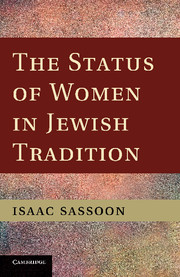Book contents
- Frontmatter
- Contents
- Preface
- Acknowledgements
- Glossary
- Abbreviations
- PART I MONOGAMY
- PART II COMMANDMENTS (MIṢVOT)
- 8 Zeman Gerama
- 9 Derekh
- 10 The Scriptural Evidence
- 11 Deuteronomy: A Pattern
- 12 The Priestly Torah
- 13 Two Writers on Purity Law
- 14 Torah Study
- PART III INTRINSIC EQUALITY
- Conclusion
- Bibliography
- Index of Authors (Medieval & Pre-modern)
- Index of Citations from Rabbinic Literature
- Index of Names (Hebrew Bible)
- Index of Names (Talmudic)
- General Index
13 - Two Writers on Purity Law
Published online by Cambridge University Press: 01 June 2011
- Frontmatter
- Contents
- Preface
- Acknowledgements
- Glossary
- Abbreviations
- PART I MONOGAMY
- PART II COMMANDMENTS (MIṢVOT)
- 8 Zeman Gerama
- 9 Derekh
- 10 The Scriptural Evidence
- 11 Deuteronomy: A Pattern
- 12 The Priestly Torah
- 13 Two Writers on Purity Law
- 14 Torah Study
- PART III INTRINSIC EQUALITY
- Conclusion
- Bibliography
- Index of Authors (Medieval & Pre-modern)
- Index of Citations from Rabbinic Literature
- Index of Names (Hebrew Bible)
- Index of Names (Talmudic)
- General Index
Summary
The time has now come to see how others understand the Torah's systems of ṭuma‘ah/ṭaharah as they relate to men and women. Two books in particular tackle the subject head on.
In her book Woman, Cult, and Miracle Recital, Marla J. Selvidge charges that between them, Leviticus chapters 12 and 15 manage to give women a raw deal. Under the heading “The Inequality of the Sexes in Levitical Legislation and in the Old Testament/Hebrew Bible,” she writes:
Purity laws served to separate men from women, community from state, elect from non-elect, Jew from non-Jew, and God from people. … Danger resulted from normal or abnormal discharges of the body. The Levitical purity laws were designed to control the activity of persons in this condition. The following discussion will center on Leviticus chapter 15 as it compares the purity laws governing women and men. At first sight there appears to be no inequity in the purity laws. A careful comparison of the verses that apply strictly to men, and the verses that apply strictly to women, yield some surprising results. … At the birth of a male the woman is unclean for seven days. Before she can return or re-enter into the cultic and social life of the community she must wait an additional thirty [sic] days (Lev12:1–4). If a female is born, the confinement is doubled (Lev12:5–8). … At the end of the woman's seclusion she must offer a sacrifice for sin (Lev12:8). If a man has a normal seminal discharge he is only unclean until evening. … […]
- Type
- Chapter
- Information
- The Status of Women in Jewish Tradition , pp. 83 - 99Publisher: Cambridge University PressPrint publication year: 2011



